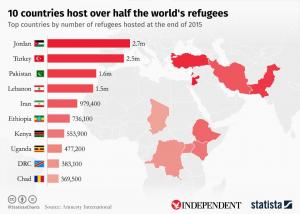You are here
- Home
- Opening up Development: including the elder refugee group in debates and policies
Opening up Development: including the elder refugee group in debates and policies
6 June 2019

This blog is written by Dr Sameen Zafar. Dr Zafar holds a PhD in Development Economics and a MSc in Economics from the University of Nottingham and will be attending the Development Studies Association Conference this month as a panellist during the Early Career Researcher session (18:00 on Thursday 20 June). For those who are unable to join us, the session is being streamed live and will be available afterwards.
In an increasingly close-knit world, it is important to include the voices of all the marginalized groups in policy circles. The elderly, particularly those based in poor developing countries, who are sometimes forced to flee their homelands due to wars and disasters and live as refugees in foreign lands, are often left out from such debates and policies. In this context, there is a need for new research as well as qualitative and quantitative surveys which exclusively focus on the elderly refugee population to ensure that the aged refugees are included in wellbeing and economic analyses. It is also important for the practitioners to include the elderly refugees in their studies to examine their cultural and economic contribution to foreign societies.
Refugees of all age groups are living in different countries across the globe. Most of them flee their homes to escape violence, conflict and appalling living conditions and settle in different countries to attain security, peace of mind, an improved standard of living and better opportunities for education and employment. While the younger refugees are able to adjust to their new lives fairly quickly and get engrossed in the faster pace of life by enrolling in schools or universities, supported by teachers and mentors, the older refugee population usually takes much more time to adjust to their new lifestyle and living conditions. My research is geared towards opening up development for the older refugee population. The target population which is included in the group are those who are about above 60 years of age. Being older restricts the opportunities available to such refugees. Hence, the economics and development studies experts need to focus their attention on this age group of refugees. And they need to come up with strategies to integrate the older refugee groups in their host countries via a number of policies.
Firstly, it is important to provide good health care facilities to this age group. Secondly, they need to be provided with employment opportunities suited to their age and skills. A skills assessment for this group could be undertaken. If possible, training and occupational therapy may be provided to this group to enable them to economically contribute in the society. Thirdly, it is important to learn from this group of the refugee population. Cultural and teaching events should be organised where this group can impart knowledge to the people about different cultures, way of livings and their experiences. This would promote greater mutual understanding between this age group of the refugees and the citizens of the host countries.
It is time to include the elder refugee group in development debates and policies.
Share this page:
Contact us
To find out more about our work, or to discuss a potential project, please contact:
International Development Research Office
Faculty of Arts and Social Sciences
The Open University
Walton Hall
Milton Keynes
MK7 6AA
United Kingdom
T: +44 (0)1908 858502
E: international-development-research@open.ac.uk
.jpg)